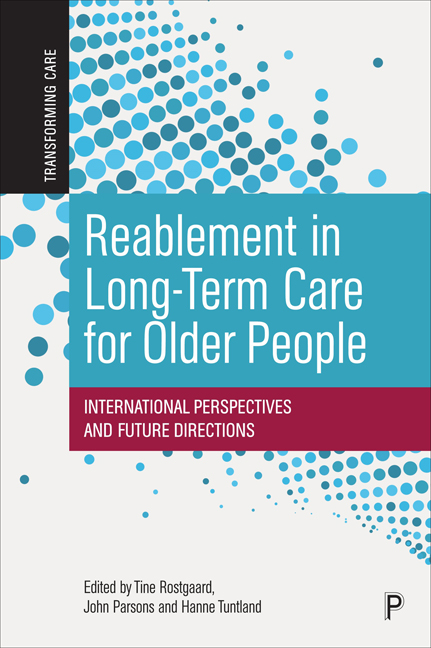6 - Examining client-level outcomes and instruments in reablement
Published online by Cambridge University Press: 18 January 2024
Summary
Introduction
Given the interdisciplinary nature of reablement, the various components the intervention consists of, and the wide range of potential outcomes needed to evaluate the effects of reablement, there is clearly a need to elaborate the issue of client-level outcomes within the context of reablement. As presented also in the previous chapter, the term client-level outcomes refers to outcomes that are directly associated with the individual who is engaged in reablement, such as increased mobility or quality of life. Ideally, there is a logical link between what the intervention intends to affect and the outcome measure that is used to evaluate that effect (Whyte and Hart, 2003; Coster, 2013). Thus, there is a need for a good match between the outcomes that reablement (per definition) is intended to affect and the instruments that are used to capture these outcomes (Coster, 2013).
In this chapter, the issue of client-level outcomes for evaluating reablement is elaborated. The chapter examines client-level outcomes and instruments used in empirical, clinical trials regarding reablement, and provides an overview of this. In clinical practice and research, outcomes are used to identify changes in the client's health condition and functioning over time. The chapter is not about what clients have identified as their preferred outcomes, but rather what the researchers of the included studies have identified as relevant outcomes. The chapter presents what outcomes and instruments have been applied in the reablement research, as there is a lack of such an overview in the existing literature. There has been a tendency for some reablement researchers, in particular within the Scandinavian countries, to be inspired by each other to use the same outcomes and instruments as used in earlier published studies, possibly without a comprehensive understanding of what outcomes and instruments would be preferable to use. Nonetheless, the authors of this chapter hypothesise that there is a wide range of outcomes and instruments being used, and little consistency across studies and countries globally, which is hampering comparability (see also Chapter 5 by Lewin et al). Hence, the chapter investigates which client-level outcomes and instruments to measure client-level outcomes have been used in clinical trials in various countries. Based on the findings, the chapter also includes recommendations with regards to which outcomes might be used in clinical practice and research.
- Type
- Chapter
- Information
- Reablement in Long-term Care for Older PeopleInternational Perspectives and Future Directions, pp. 118 - 136Publisher: Bristol University PressPrint publication year: 2023



